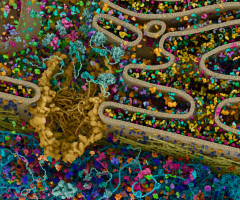
Using new and innovative immune-therapeutic approaches to silence "don't eat me" signalling proteins recognised by specialised cells of the immune system, University of California, Irvine molecular biologists and their colleagues have identified an effective way to combat metastatic melanoma.
Led by Alexander D. Boiko, UCI assistant professor of molecular biology & biochemistry at the Ayala School of Biological Sciences and the Sue and Bill Gross Stem Cell Center, the researchers discovered that blocking the cell surface protein, CD47 (known as a "don't eat me" signal), on melanoma cells, increased the degree by which these cells were phagocytosed, or "eaten," by macrophages.
The team further discovered that blocking CD47 in combination with targeting a second cell surface protein, CD271, previously found to be expressed on melanoma initiating cells, resulted in virtually complete inhibition of metastases arising from human melanoma tumours transplanted in mice.
The full study appears in Cell Reports.
The cell surface protein CD47 was found to be overexpressed by metastatic melanomas, which helps them avoid being eliminated by the organism's immune system. CD271, on the other hand, had been previously shown by Boiko to mark a cell population in melanomas responsible for tumour initiation and metastatic spread of this aggressive cancer.
For the current study, Boiko and his team conjectured that metastatic melanomas relied on the overexpression of both proteins to fool the immune system and spread to other areas of the body.
To test this hypothesis, Boiko and his colleagues used specific blocking antibodies against CD47 (to activate macrophage phagocytosis) and CD271 (to selectively target the most aggressive melanoma cell population).
When mice bearing human metastatic melanomas were treated with this antibody regimen, researchers discovered that simultaneous application of antibodies against CD47 and CD271 resulted in near complete elimination of metastasis from all organs of experimental mice.
Boiko's group has further discovered that this therapeutic effect was mediated by profound alteration of the microenvironment surrounding the tumours, causing immune cells to fight cancer more effectively.
"Further research is needed to determine the full anti-metastatic properties of the dual CD47/CD271 antibody therapy and the safety of its application in human patients," Boiko said. "However, combining this therapy with other emerging treatments that also modulate the immune system represents a new approach that may offer increased benefit against metastatic melanomas. These are very exciting times for the cancer immunotherapy field and we are aiming to add an important component to this type of treatment, which will hopefully translate into a more effective outcome for patients."
Source: Cell Reports
We are an independent charity and are not backed by a large company or society. We raise every penny ourselves to improve the standards of cancer care through education. You can help us continue our work to address inequalities in cancer care by making a donation.
Any donation, however small, contributes directly towards the costs of creating and sharing free oncology education.
Together we can get better outcomes for patients by tackling global inequalities in access to the results of cancer research.
Thank you for your support.